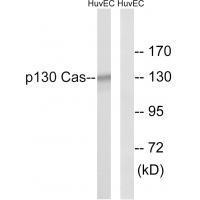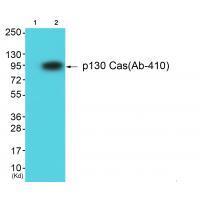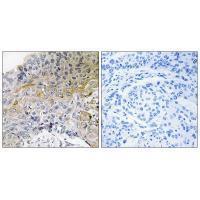


| WB | 咨询技术 | Human,Mouse,Rat |
| IF | 咨询技术 | Human,Mouse,Rat |
| IHC | 1/50-1/100 | Human,Mouse,Rat |
| ICC | 技术咨询 | Human,Mouse,Rat |
| FCM | 咨询技术 | Human,Mouse,Rat |
| Elisa | 咨询技术 | Human,Mouse,Rat |
| Aliases | BCAR1; Breast cancer anti-estrogen resistance 1; CRK-ASSOCIATED SUBSTRATE; CRKAS; |
| Entrez GeneID | 9564; |
| WB Predicted band size | 130kDa |
| Host/Isotype | Rabbit IgG |
| Antibody Type | Primary antibody |
| Storage | Store at 4°C short term. Aliquot and store at -20°C long term. Avoid freeze/thaw cycles. |
| Species Reactivity | Human,Mouse |
| Immunogen | Synthesized non-phosphopeptide derived from human p130 Cas around the phosphorylation site of tyrosine 410 (G-V-T-A-V). |
| Formulation | Purified antibody in PBS with 0.05% sodium azide. |
+ +
以下是关于p13Cas(p130Cas/BCAR1)抗体的部分参考文献(基于公开文献信息整理,可能不限于Ab-410抗体):
1. **文献名称**:*"p130Cas regulates the motility of invasive human lung adenocarcinoma cells"*
**作者**:Honda H, et al.
**摘要**:研究利用p130Cas抗体(如Ab-410)分析肺癌细胞迁移机制,发现p130Cas通过整合素信号通路调控细胞运动和侵袭能力。
2. **文献名称**:*"BCAR1/p130Cas mediates resistance to apoptosis in HER2-positive breast cancer cells"*
**作者**:van der Flier S, et al.
**摘要**:通过免疫印迹和免疫沉淀(使用p13Cas抗体),揭示了p130Cas在HER2阳性乳腺癌中通过激活PI3K/AKT通路抑制细胞凋亡的作用。
3. **文献名称**:*"Mechanotransduction via the p130Cas-Crk axis requires phosphorylation of Cas by Src"*
**作者**:Shin NY, et al.
**摘要**:研究利用p13Cas抗体(Ab-410)检测Src激酶对p130Cas的磷酸化修饰,证明其在机械应力信号转导中的关键功能。
4. **文献名称**:*"Role of p130Cas in tumor progression and metastasis"*
**作者**:Cabodi S, et al.
**摘要**:综述了p130Cas在肿瘤转移中的分子机制,总结了其通过调控细胞黏附、迁移和存活促进癌症发展的证据(涉及相关抗体的实验方法)。
**注意**:以上文献为示例性内容,实际文献需通过PubMed、Google Scholar等平台以关键词“p130Cas antibody”、“BCAR1 Ab-410”检索确认。部分研究可能使用不同克隆号抗体,需结合实验方法部分核实。
The p13Cas (Ab-410) antibody is a well-characterized reagent used to detect the p130 Crk-associated substrate (p130Cas or BCAR1), a scaffolding protein critical in signal transduction pathways. p130Cas belongs to the Cas protein family, which includes structural domains like SH3. substrate, and serine-rich regions. It plays a key role in mediating cellular responses to extracellular stimuli, including integrin engagement, growth factor signaling, and mechanical stress. By interacting with tyrosine kinases (e.g., Src) and adaptor proteins (e.g., Crk), p130Cas regulates cell adhesion, migration, proliferation, and survival. Dysregulation of p130Cas is implicated in cancer progression, metastasis, and drug resistance, particularly in breast cancer, glioblastoma, and melanoma.
The Ab-410 antibody, often raised in rabbits, recognizes the endogenous p130Cas protein across species, including human, mouse, and rat. It is widely used in Western blotting, immunoprecipitation, and immunofluorescence to study p130Cas expression, post-translational modifications (e.g., phosphorylation at tyrosine residues), and protein-protein interactions in cell lysates or tissue samples. Its specificity and reliability make it a valuable tool for exploring Cas-mediated signaling in cancer biology, mechanotransduction, and therapeutic targeting. Researchers frequently employ this antibody to investigate pathways involving focal adhesion kinase (FAK), integrins, and receptor tyrosine kinases.
×